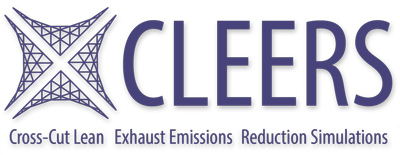Impact of catalyst zoning and permeability on performance of a Diesel Oxidation Catalyst Filter Through Device Scale Modeling
Kenneth Rappe, Pacific Northwest National Laboratory
This talk will summarize studies on the impact of catalyst zoning and wall permeability in a catalyzed diesel particulate filter also known as a diesel oxidation catalyst filter (DOCF). Device scale DOCF models were developed using Exothermia with catalyst reaction kinetics calibrated from previous studies and data supplied by an OEM. An initial model of an OEM DOCF was created using a literature model with guidance from Exothermia to represent different zoning configurations of a 2:1 Pt:Pd catalyst combined with a full length 12:1 Pt:Pd catalyst. These models were evaluated with regards to hydrocarbon slip under active soot regeneration conditions, and soot oxidation under active and passive regenerations conditions. Along with catalyst zoning, differing wall permeabilities within those catalyst zones were study in regard to the effect of other DOCF functions. This research is conducted inform on the performance of the DOCF device and support the development of higher performing and lower cost DOCFs.

